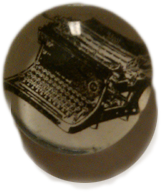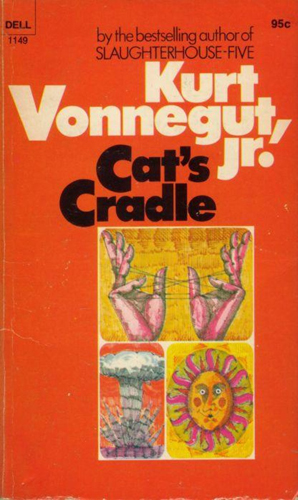
|
|
Cat's Cradle
by Kurt Vonnegut, Jr.
Reading Review by Michael Channing
This is way the world ends, not with a bang but with an ah-whoom. That's the sound of all the world's oceans freezing solid at once. Even though this occurs near the end of the book, I don't feel I'm giving anything away. Vonnegut introduces the fictional substance of ice-nine early in Cat's Cradle, explaining that it is a form of water that freezes at room temperature and thaws at 113 degrees Fahrenheit. The atoms are arranged so as to instantly pass on their structure to other water molecules they come in contact with, causing that water to freeze immediately until all water within the container is solid. If that container happens to be the ocean, then all connected rivers, streams, and lakes would also become solid and undrinkable. All this is explained to us by a colleague of Felix Hoenikker, the (fictional) scientist who helped create the atomic bomb that was dropped on Hiroshima. Felix came up with the theory for ice-nine when a general put to him a thought experiment: how can the American army overcome the hindrance of marching through mud? Was there a way to solidify the mud so our boys could simply march across it? Unknown to anyone but his children, Hoenikker actually creates such a substance. He doesn't do it in service of our or anyone else's army. He does it because he just wants to do some science. That's what he's always done, science for the sake of science without thought of consequence, cost, or casualties. This blind, unrestrained advancement of science without consideration of its repercussion is the main target of Vonnegut's ire.
The story unfolds through a series of interviews, anecdotes, and letters. So much of the first half of the book is told through these methods that you feel as if you're being briefed on the lives of the characters rather than being told a story. But despite Vonnegut's unconventional narrative structure, you can't help but be drawn in. He mentions the ice-nine several times, never letting you forget its existence, always implying that it will do its job and end the world. With the "surprise" already out of the bag, you feel obligated to focus on the details that lead up to the end, something the narrator couldn't do when he actually lived through them. We the readers have the foreknowledge the narrator wishes he had, but we still can't change the outcome. We're locked into the predestination that Bokononism preaches.
Bokononism, by the way, is the religion that Vonnegut invented for this book. By "coincidence" the narrator and the three children of Felix Hoenikker end up on the island of San Lorenzo, an island completely lacking in beauty and natural resources. A man washed up on its shore decades ago and decided to help the inhabitants by creating a religion to help them get through their dreary lives. By the inventor's design the religion is outlawed, making it that much more enticing and precious to its practitioners. Bokononism is Vonnegut's greatest invention here, though the book is usually known for the science fiction artifact of ice-nine. We get the tenets of the religion through Twitter-ready quotes from Bokonon's writings. "Live by the harmless untruths that make you brave and kind and healthy and happy." "Peculiar travel suggestions are dancing lessons from god." Then there's the Fourteenth Book of Bokonon, entitled "What can a Thoughtful Man Hope for Mankind on Earth, Given the Experience of the Past Million Years?" The entire text of the Fourteenth book consists of one word: "Nothing."
Bokononism offers a bleak view of humanity, and the characters in Cat's Cradle do very little to dissuade you from it. Almost all of them are petty, conniving, co-enabling, and selfish. The narrator himself shows his own hand when he judges everyone by their physical appearance, calling the Hoenikker daughter horse-faced and referring to Bokonon as a jigga-boo bastard in a moment of frustration. Bokonon, however seems like a genuinely humble and kind human being, and the American diplomat to the island of San Lorenzo delivers a moving anti-war speech on par with Charlie Chaplin's at the end of The Great Dictator. But humanity as a species seems to be deliberately slouching toward its own destruction as it favors scientific achievement over emotional growth and short-term luxury over lasting security. In short, it's hard to like most of these characters.
But the writing, as in all Vonnegut books, takes center stage. Every chapter, the longest of which is three pages long, ends with a sharp shock, a brilliant punch line wrapping up the topic of the chapter and thrusting us into the next. This is a book that begins with the writing of a book about the end of the world and itself becomes a book about the end of the world. The plot slowly condenses out of a chaos of memories and inter-textual documents, just as the lives of the characters all converge on one location. God has gathered them together to perform the task of ending the world. The author has gathered them together to create this book.
It's weird to compare Vonnegut, a life-long atheist, to god. But since Bokonon has such disdain and half-respect for his creator, it seems fitting to call Vonnegut the god of his books. He always has some kind of message or agenda with his novels, and each feels not quite so much like a single story but more of a collection of fables. Here are Vonnegut's fables about science, weaponry, war, fate, and religion. I don't think he ever truly believed he was changing the world or spreading any truth, but he caused no harm and brought entertainment and heavy smiles to millions. That's more than the atom bomb ever did.

More Reading Reviews
|
|

|

|

|

|

|
Novel November |
Beyond This
|
And Another
|
To the Heart of the
|
Charlie and the
|
The Stand
|


